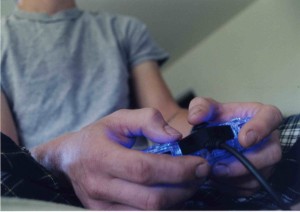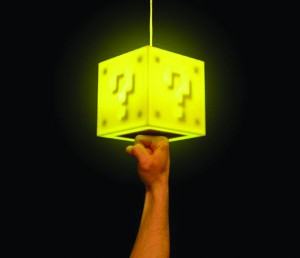A fleet of airships roars overhead as Connor reloads his magazine. “Soldier, come in! We are under attack at the shipyard three clicks southwest of here! I need you and your men to hold the left flank! Do not trust Shepherd. I repeat, do not trust…” A barrel of fuel explodes as Connor dives to the floor, narrowly avoiding another Luftwaffe airstrike. “That was close,” he curses under his breath. For a moment, everything is silent. Then out of nowhere, a bullet nicks Connor in the neck. He cries out in pain. The screen fades to black.
GAME OVER. PLAY AGAIN?
A fleet of airships roars overhead as Connor reloads his magazine…
Anyone who has played a video game before has had to face the inevitable “game over” screen.
Often, you don’t expect it to end so quickly: Whether you won or lost, you were probably convinced that you could score higher if you were given one more try.
So, like Connor, you paid another fifty cents to play again.
Are you addicted?
According to Marc Potenza, a clinical psychiatrist at Yale and one of the foremost researchers on addictive behaviors, you might be. In the most recent edition of the Diagnostic and Statistical Manual of Mental Disorders, video game addiction was officially classified as a mental disorder. Coined Internet Gaming Disorder (IGD), this condition is characterized by excessive video gaming, which may cause players not only to put off other obligations, but also to experience clinically significant stress and impairment. Potenza has not only helped to define this classification in the literature, but has also characterized and identified symptoms associated with IGD. For example, his work has shown that addicted gamers, like other addicts, may experience symptoms of withdrawal when their game ends. But instead of craving a puff on a cigarette, these people have become dependent on virtual reality as an escape from the stress of everyday life.

Addiction on a new level
Although IGD is a relatively new phenomenon, it may be becoming increasingly more prevalent around the world because of teenagers’ immense dependence on video games for entertainment, especially in North America. Researchers have been actively trying to spread awareness about IGD in order to prevent the onset of compulsive behavior. Because young individuals are particularly susceptible to addiction, teenagers (and their parents) tend to be the focus of most of this work. Potenza is one of the leading scientists contributing to this widespread push.
A professor of psychiatry at Yale, Potenza studies substance abuse, impulse control, addictive gaming and other neurobiological conditions at the Yale School of Medicine. Although initially interested in addictive forms of gambling, he has more recently focused his efforts on video game addiction. His changing interests reflect a characteristic trend of our generation: the tendency to incorporate technology into daily life without fully understanding the consequences. Along with many other scientists, Potenza considers how changes in Internet use might impact public health. His goal, he explains, is “to think about Internet use, how it’s been changing, and the public health implications of different patterns of Internet use.” In his latest study, published in the Journal of Psychiatric Research, Potenza helped define IGD and identified the fundamental domains that make up the IGD model.

The symptoms
According to Potenza, people with IGD exhibit three key characteristics. First, addicted gamers typically have “enhanced reward sensitivity and decreased loss sensitivity.” In other words, people with IGD tend to value winning much more than they value losing. Because of this, they strive for immediate achievement and disregard short-term failure, which keeps them playing longer.
Secondly, addicted gamers have “reduced response-inhibition and cognitive control.” This means that people with IGD have less control over their cravings and are therefore able to put aside consequences more easily.
Finally, addicted gamers are worse at making decisions when both short-term and long-term considerations are involved. Essentially, individuals with IGD tend to give short-term pleasures more value than long-term negative consequences. For example, addicted gamers value playing online and in the moment more highly than performing activities that relate to occupational success in the future.
Are you starting to worry? As Potenza points out, it really should not be a surprise that one can become addicted to video games, or to other behaviors, for that matter.
“There are several core elements,” he explains, “that appear to be shared across all types of addiction, including compulsive engagement in a behavior despite adverse consequences, diminished control over engagement in the behavior, and a craving state that immediately precedes the engagement.” Video game addiction, therefore, is just another form of addiction. Consider substance abuse, excessive gambling or even binge-eating: all of these behaviors incorporate engagement in an activity with reduced self-control and result in negative consequences. Addictive video gaming is similar.
What is perhaps more unexpected, however, is that video gaming and substance abuse are very similar neurologically. For example, studies have shown that people with alcohol dependence and IGD exhibit similar connectivity patterns in the dorsolateral prefrontal cortex. Furthermore, teenagers who exhibited frequent use of nicotine, alcohol, and cannabis are almost twice as likely to have IGD, confirming a correlation between these types of addictive behaviors.
Powering down
Because of these biological parallels, IGD can be treated in some of the same ways as the traditional forms of addiction. So far, cognitive behavioral therapy has been shown to be the most effective treatment to help patients overcome addictive gaming. “Patients learn to identify triggers that may predispose them to engagement in addictive gaming,” says Potenza, “and then are trained to manage those triggers.”

Motivation enhancement therapy and cognitive bias modification have also been proposed to relieve symptoms of IGD because of their similar successes in substance abuse therapy, but neither of these treatment methods has actually been tested on addicted gamers yet. Furthermore, scientists are starting to formulate pharmaceutical drugs based on functional brain patterns that may prove even more successful for overcoming all types of addictive behaviors, including IGD.
“Where the gambling field was ten to fifteen years ago might be where we are with the gaming field now,” Potenza says. “We have been trying to look at similarities and differences with respect to clinical aspects of the conditions, with respect to biological aspects, genetic aspects, brain imaging measures, and then to think about how me might translate that information into better prevention, treatment, and policy efforts.”
Nevertheless, whether it’s Pac-Man or Call of Duty, Minecraft or Mario Kart, the words “game over”—which seem simple to most of us—can mean a great deal to someone with IGD. The phrase signifies not only the end of a game, but also the end of a virtual world that had been providing momentary relief from the anxiety, stress, and reality of the real world.
It can be scary to “hit the reset button” and come to terms with any kind of addiction. But as more and more research is dedicated to characterizing these disorders and clinically testing models that may help people overcome them, it seems possible that addictive gaming will soon be treatable with a wider range of validated approaches. So, as addicted gamers learn to overcome their IGD, it is the aspiration of this scientific community that addicts will eventually realize to keep their video games, and not their lives, on pause.
Extra Reading:
- Yau YH, Potenza MN, White MA. Problematic Internet use, mental health and impulse control in an online survey of adult (2013). Journal of Behavioral Addiction. 2(2): 72.
- Liu TC, Desai RA, Krishnan-Sarin S, Cavallo DA, Potenza MN. Problematic Internet use and health in adolescents: data from a high school survey in Connecticut (2011). Journal of Clinical Psychiatry. 72(6): 836-45.
About the Author: Adam Pissaris is a junior in the biomedical engineering major in Morse College. He is the Distribution Manager for the Yale Scientific Magazine and a captain of the Yale Club Soccer Team.
Acknowledgments: The author would like to thank Dr. Potenza for his immense support and for his assistance with this topic.
